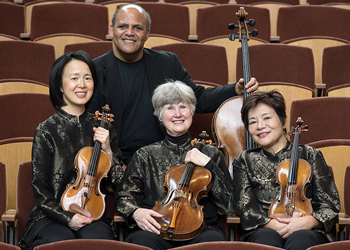by David Kulma

Violinists Miho Hashizume and Takako Masame, violist Lynne Ramsey, and cellist Ralph Curry — all members of The Cleveland Orchestra — played the early quartet with a feathery lightness. Hashizume handled the virtuosic first violin part with ease. The three fast movements were a joy to hear, but the variation-based third movement was easily the highlight of this performance. The theme was beautifully songful, while the ever-more elaborate variations captured a verdant atmosphere with twittering birds and a rugged folk jamboree along the way. Indeed the Amicis’ reading suggested the intimacy of friends playing this lovely quartet together.
Following intermission came the late quartet — Beethoven’s longest at 45 minutes, and some of his best music. Following a stark opening, the obsessive first movement proceeds with intense paragraphs of sweeping fast music. The happier scherzo busily piles up lots of small ideas, while the contented drone-based trio pleasingly bubbled along in the hands of the Quartet.
Beethoven’s full title for the slow movement, written after a near-fatal illness, translates as “holy song of thanksgiving of a convalescent to the divinity, in the Lydian mode.” The Amici beautifully paced this Molto Adagio that juxtaposes profoundly archaic modal counterpoint with celebratory D-major sections marked “feeling new strength.” The gorgeous slow counterpoint over the movement’s 18-minute duration was the definition of sublime — so patient and determined to speak fully that it creates a holy, almost bewildering atmosphere.
The short bouncing march and Masame’s blustering violin recitative-cadenza led straight into the passionate finale that ends in a blaze of A-major glory. The Amici clearly put a lot of thought and time into their interpretation of this grand monument of music for string quartet.

Published on ClevelandClassical.com February 18, 2019.
Click here for a printable copy of this article


